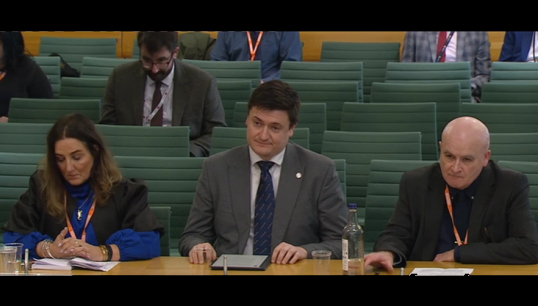Nautilus calls for strengthening of Employment Rights Bill to prevent another P&O Ferries
29 November 2024

Nautilus International has told MPs that loopholes allowing 'fire and rehire' must be closed by the UK government's Employment Rights Bill during an evidence-gathering session in Parliament.
The Bill is currently at committee stage during its passage through the House of Commons. This is where a detailed examination of the Bill takes place and experts and interest groups from outside Parliament are called upon to speak. Every clause in the Bill is either agreed to, removed or amended by MPs on the committee during this stage.
Speaking to the MPs during a panel that also featured Gemma Griffin, vice-president of global crewing for DFDS, and Mick Lynch, general secretary of the RMT union, Nautilus director of organising Martyn Gray said that the Bill, while a positive step, requires improvement.
'This Bill goes some of the way towards addressing the issues that were exposed by P&O Ferries' decision to terminate 786 people in March 2022 without notice and without consultation, but it still does not go far enough to place the rights and protections of those who are working at sea on a par to the rights and protections of those working in shore-based roles and with shore-based employment contracts,' he said.
'More can still be done to allow for greater protections for those that work at sea. That's fully within the remit of this Parliament to be able to legislate for.'
He stated the Union's concerns about the Bill's failure to properly address fire and rehire by including consequences for those that choose to undertake the practice. 'If directors can sign off their business as a going concern, fire and rehire should not be an option for them,' he said.
'If we are looking at a scenario where directors are happy to say under companies legislation that the business is a going concern but they need to do a complete restructure, strip away the employment rights, strip away the benefits, strip away working conditions – things that have been long fought over for many years of negotiation and discussion – then that business is not in a position where they should be able to consider it a going concern. I would set a really high threshold, and then allow for scrutiny from the relevant bodies. If it turns out that fire and rehire could have been avoided, it is clear that those directors should not have gone through it and there must be consequences.'
Mr Gray went on to express his support for some aspects of the Bill, especially the fact that it would ensure vessels are no longer treated as individual establishments. This would ensure that businesses would not be able to circumvent the need to consult with recognised trade unions on what amounts to mass redundancies because multiple 'establishments' are involved. 'That is a really helpful feature of the Bill, and something that I think should be celebrated and praised. It is going to be very helpful in being able to defend our members' rights and hold companies to account when going through a redundancy process or collective consultation on business restructuring in organisations.'
He also stressed the benefits of reintroducing sectoral collective bargaining between trade unions and industry representatives, as was previously undertaken thirty years ago by the National Maritime Board, which would establish the minimum rates of pay which unions could then take to individual employers and build upon. This process is already conducted by Nautilus International in the Netherlands.
Speaking for DFDS, Ms Griffin said: 'As it stands, I do not believe that our seafarers are currently covered by the Bill. My understanding is that there is an opportunity today to talk to yourselves about ways or mechanisms by which we may be able to enshrine something for seafarers, so that they can be afforded similar rights and opportunities as shore-based workers.
'The key point in the Bill currently relates to fire and rehire. That is the sort of stuff that we as DFDS are very pleased that you will be banning, and I hope that it does actually refer to seafarers as well. For us, that is the biggest concern among the many others that we have, as an operator that is simply looking for a fair and level playing field.'
Speaking for the RMT, Mr Lynch added: 'The Bill does not go far enough, but we can improve it during this process. One of the things we would like to see is the power for trade unions to get redress—injunctive power—against people like P&O Ferries. We were told that if we took action against P&O Ferries, we could be liable for all its revenue loss for every day of trading, which could have been up to £15 million or £20 million a day. That is impossible for workers and their organisations to take forward.
'P&O Ferries deliberately broke the law to get rid of its workforce and to undermine good shipping companies. I just caught the end of the previous session, when the witnesses hoped that there would be a lifting of all boats – to use that pun – to create a playing field that is fairer. It will never be completely level, but it would be fairer on all the good businesses in Britain to make the pirates, which is what we consider P&O to be, come up to the standards of everyone else.'
The full session can be viewed online here.

What is the UK Employment Rights Bill?
The Institute of Employment Rights (IER) has put together a handy resource hub including a briefing on what the Bill proposes, what it considers are 'worrying trapdoors', suggested amendments, and other resources on the Employment Rights Bill (ERB) 2024.
Images: Getty Images
Tags
